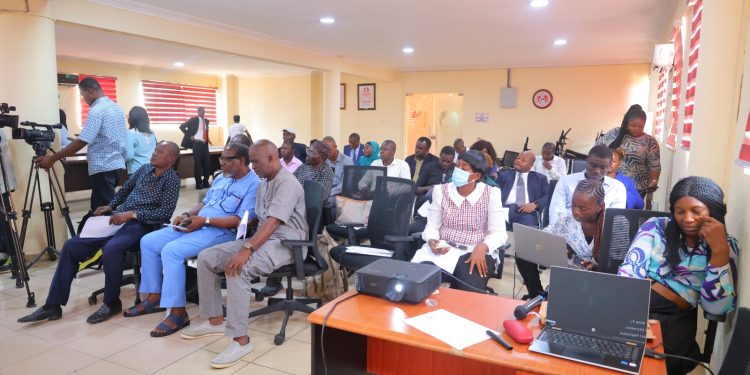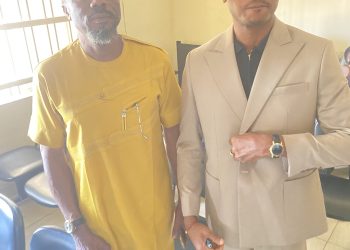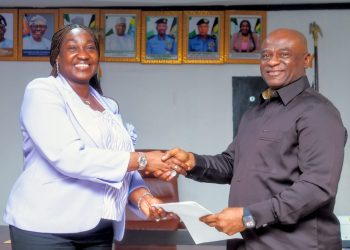By Nkechi Eze
The Executive Chairman of the Economic and Financial Crimes Commission (EFCC), Mr. Ola Olukoyede, has called on the media and Civil Society Organisations (CSOs) across Nigeria to strengthen their commitment and collaboration in amplifying the national fight against corruption, economic sabotage, and financial crimes.
According to an official statement signed by the Commission’s spokesperson, Dele Oyewale, the EFCC Chairman made the appeal on Thursday, October 16, 2025, during a one-day capacity-building workshop for journalists and CSO representatives held in Lagos.
Olukoyede said the initiative underscores the EFCC’s recognition of the media and civil society as critical allies in promoting transparency, accountability, and good governance across all sectors of the nation’s life.
Represented at the event by the Acting Directors of the Lagos Zonal Directorates, ACE I Adebayo Adeniyi and ACE I Ahmed Ghali, the EFCC Chairman emphasized that journalists and CSOs possess the unique capacity to inform, educate, and mobilize public opinion—tools he described as essential weapons in the anti-graft campaign.
“Your ability to inform, educate, and mobilize public opinion is a critical asset in the fight against corruption, fraud, and other economic crimes,” Olukoyede stated. “The media and CSOs must, therefore, remain at the forefront of promoting a culture of integrity and accountability. The media must continue to hold public institutions accountable, while civil society organizations must deepen civic engagement and promote transparency at all levels.”
He noted that many citizens fall prey to fraudulent schemes due to a lack of timely and accurate information, stressing that both journalists and CSOs have a civic duty to expose wrongdoing and sustain public awareness on the dangers of corruption.
While commending the media and civil society for their consistent support of the EFCC’s mandate, Olukoyede also acknowledged the growing complexity of financial crimes and the challenges faced by reporters in interpreting and communicating intricate economic offenses.
The interactive workshop featured technical presentations by seasoned EFCC officers, who provided deep insights into the Commission’s operations, challenges, and preventive frameworks.
In his paper titled “Prosecuting Financial Crimes: Issues, Challenges and the Way Forward,” Deputy Commander of the EFCC (DCE) Aso Larrys Peters, Head of Legal and Prosecution Department, Lagos Zonal Directorate I, highlighted the rigours of prosecuting economic and financial crimes, calling for stronger inter-agency collaboration and better understanding of legal procedures among media and civic actors.
Also presenting, DCE Dele Oyewale, Head of Media and Publicity and EFCC Spokesperson, spoke on “The Role of CSOs and Media in Driving a Preventive Framework in the Fight against Corruption.” He charged participants to use their platforms to expose fraudulent and corrupt practices in all sectors and to engage communities in grassroots sensitization campaigns against economic crimes.
On his part, Chief Superintendent of the EFCC (CSE) Alex Ogbole, Head of Digital Forensics, Lagos, delivered a paper titled “Understanding Cryptocurrency Fraud and Other Emerging Financial Crimes.” He educated participants on the rising trends in cyber-enabled crimes, distinguishing between legitimate cryptocurrency transactions and fraudulent schemes, and advising Nigerians to remain vigilant and informed.
In another contribution, Assistant Commander of the EFCC (ACE II) Aisha Mohammed, Head of Enlightenment and Re-Orientation, urged civil society organizations to key into the EFCC’s nationwide advocacy platforms such as the Integrity Club, Zero Tolerance Club, and NYSC/Community Development Groups, to further advance the anti-corruption message among young Nigerians.
The workshop, which provided a forum for robust discussions between EFCC officials, journalists, and civil society representatives, ended with participants expressing satisfaction with the depth of engagement and the knowledge gained.
They commended the EFCC for its sustained efforts in fostering collaboration and pledged to intensify public sensitization efforts to help curb corruption and financial crimes in the country.















